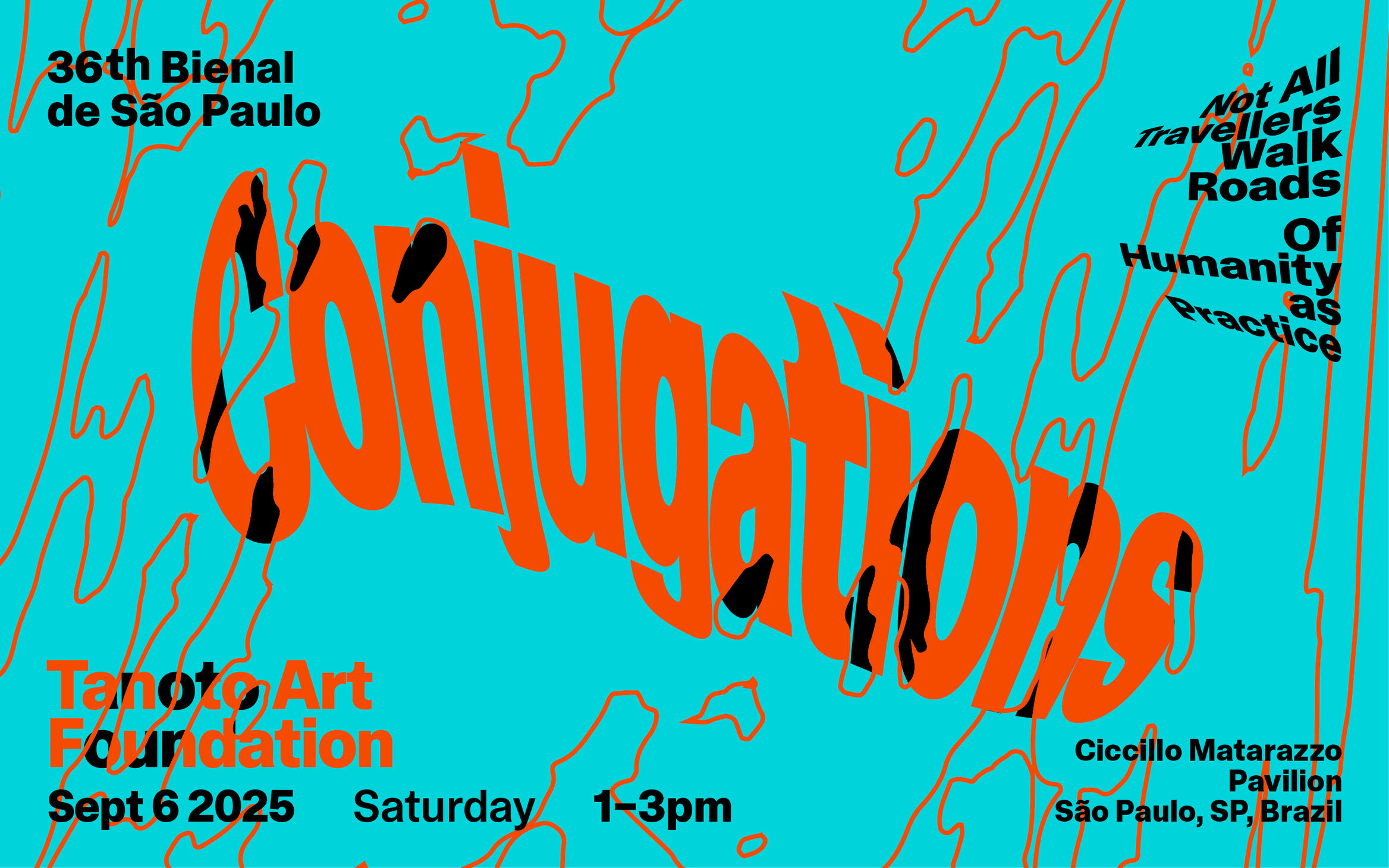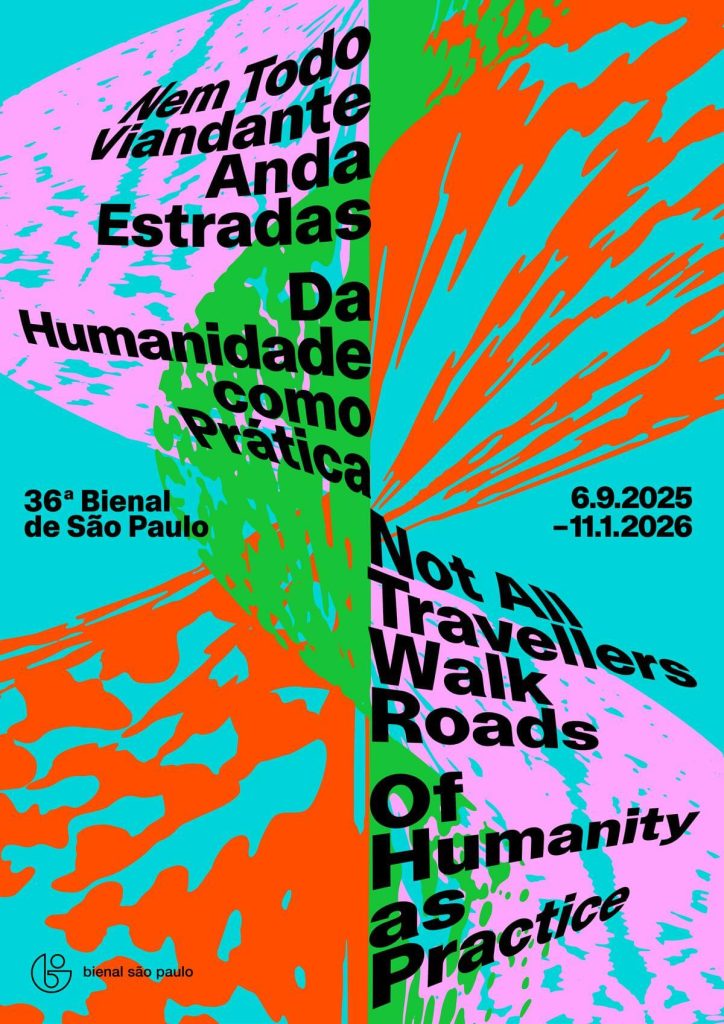
Date: Saturday, 6 September 2025
Time: 1.00PM – 3.00PM
Location: Ciccillo Matarazzo Pavilion, São Paulo, Brazil
As part of the São Paulo Biennial’s Conjugations program, this iteration of the TAF Conversation brings together five artists from Southeast Asia—Korakrit Arunanondchai, Murni, Trin Thi Nguyễn, Tuấn Andrew Nguyễn, and Trương Công Tùng—whose works are featured in the biennial, alongside their collaborators, writer and art historian Putu Sridiniari and scholar Julia Bryan-Wilson. Conceived as a syncretic and hybrid gathering, the event unfolds through a series of screenings, a talk, a panel discussion, and a performance that explore the relationships between memory-making and material traditions. The thoughts, sounds, words, and movements presented in this space offer a deep meditation on humanity and the sensory intelligence it shares with the living world and its many beings.
About TAF Conversation Series
Developed to manifest the foundation’s process-based and research-driven programming, TAF Conversation Series engages artists and their collaborators to respond, reflect, and shape TAF’s research concerns. Intently blurring the line between the work-in-progress and its finished form, TAF Conversation Series highlights the process and flux of artistic practice, where transformation is constant. TAF’s 2025 / 2026 research rubric is Materiality.
About the Fundação Bienal de São Paulo

Image courtesy of Studio Yukiko
Founded in 1962, the Fundação Bienal de São Paulo is a private, nonprofit institution with no party political or religious ties, whose actions aim to democratize access to culture and foster interest in artistic creation. Every two years, the Foundation holds the Bienal de São Paulo, the largest exhibition of the Southern Hemisphere, created in 1951, and its traveling exhibitions program in several cities in Brazil and abroad. The institution is also the custodian of two items of Latin American artistic and cultural heritage: a historical archive of modern and contemporary art that is a standard reference in Latin America (the Arquivo Histórico Wanda Svevo), and the Ciccillo Matarazzo Pavilion, the head office of the Foundation, designed by Oscar Niemeyer and listed as historical heritage. The Fundação Bienal de São Paulo is also responsible for conceiving and producing Brazil’s representations at the Venice Biennales of art and architecture, a prerogative bestowed upon it decades ago by the Federal Government in recognition of the excellence of its contributions to Brazilian culture.
Participant Bios
Korakrit Arunanondchai
The work of Korakrit Arunanondchai focuses on the transformative potential of storytelling. With each project, the artist expands his cosmos of interconnected stories told through expansive video installations, paintings, objects, and performative works. In his videos, he processes experiences in his personal environment just as he does political events, history and questions to our crisis-ridden present. Arunanondchai often draws upon the cultural contexts in his own biography as well as spaces with postcolonial trauma. Using essayistic and experimental approaches, the artist works with multiple collaborators to assemble audio and visual materials from various sources. With references to philosophy and myth, his narratives weave together questions about consciousness, empathy, and community.
Arunanondchai has had solo exhibitions at Museum MACAN, Jakarta, Indonesia (2024); Bangkok Kunsthalle, Bangkok, Thailand (2024); Singapore Art Museum, Singapore (2022) and Museum of Modern Art PS1, New York, NY (2014). His work has been shown at numerous biennials, with recent presentations including SITE SANTA FE (2025); Manifesta 15 (2024); Art Encounters Biennial, Timisoara (2023); Gwangju Biennial (2021); Yokohama Triennial (2020); the Venice Biennale (2019); and the Whitney Biennial (2019).
He currently lives and works between Bangkok & New York.
Julia Bryan-Wilson
Julia Bryan-Wilson is Professor of Art History and LGBTQ+ Studies at Columbia University, as well as a frequent critic who writes about feminist art, visual activism, and materiality in contemporary art. She is the author of four books, most recently Louise Nevelson’s Sculpture: Drag, Color, Join, Face (2023). Her widely influential 2017 book Fray: Art and Textile Politics received the ASAP Book Prize, the Frank Jewett Mather Award, and the Robert Motherwell Book Award. She is also Curator-at-Large at the Museu de Arte de São Paulo (MASP), where in 2024 she co-curated Histórias LGBTQIA+/Queer Histories with Adriano Pedrosa and André Mesquita. In November 2025 she will unveil two exhibitions: Lotty Rosenfeld: Disobedient Spaces, curated with Natalia Brizuela at the Wallach Art Gallery; and GUTSY: On Feminist Infrastructures, at Museum of Modern Art, Warsaw.
Murni (1966-2006)
Born in Tabanan, Bali, and raised in South Sulawesi, Murni’s early years were shaped by migration and labor. From domestic work and factory floors, she eventually found her way back to Bali, settling in Ubud. There she studied painting with I Dewa Putu Mokoh (1934-2010) and forged an artistic voice enriched by her relationship with Italian artist Edmondo Zanolini. This was also a time of growing artistic infrastructure for women artists in Bali. In the early 1990s, ISWALI (Ikatan Seniman Wanita Bali) and Seniwati Gallery of Art by Women were established and served as vital spaces for Murni. Her first solo show, One Woman Show (1995) at Seniwati Gallery, marked her artistic emergence.
At her career’s height, she exhibited in Australia, Italy, Hong Kong, Thailand, Japan, Germany, and the Netherlands, and in venues across Indonesia. She worked in painting, soft sculpture, wood, and metal. After her passing in 2006, her work inspired critical discourse on gender, trauma, and cultural memory, with renewed recognition through Merayakan Murni (2016), Museum MACAN’s Dunia dalam Berita (2019), major retrospectives, and international exhibitions. By 2023, she became the first Balinese artist in Tate Modern’s collection, and in 2024 her work was shown at the 24th Biennale of Sydney, affirming her enduring global relevance.
Trin Thi Nguyễn
Nguyen Trinh Thi is a Hanoi-based filmmaker and artist. Traversing boundaries between film and video art, installation and performance, her practice currently explores the power of sound and listening, and the multiple relations between image, sound, and space, with ongoing interests in history, memory, representation, ecology, and the unknown. Nguyen’s works have been shown at international festivals and exhibitions including documenta, Artes Mundi, Lyon Biennale, the Asia Pacific Triennale of Contempory Art, Sydney Biennale, the Mori Art Museum, and Thailand Biennale.
Tuấn Andrew Nguyễn
Tuấn Andrew Nguyễn’s work explores the power of storytelling through video and sculpture. His projects are based on extensive research and community engagement, tapping into inherited histories and counter-memory. Working collaboratively with residents and demining organizations, Nguyễn has created works that reflect the scarred landscape of such areas as the Quảng Trị region of central Vietnam, the site of the largest aerial bombardment in history. Bridging past and present, Nguyễn explores the embedded empathy and animism of objects alongside the generative power of narrative. These concepts unearth stories of resilience within communities overcoming trauma, providing a space to build new futures rooted in physical concepts of regeneration.
Nguyễn has had major solo presentations at the New Museum, New York, NY (2023); Fondació Joan Miró, Barcelona, Spain (2024); Zeitz MOCAA, Cape Town, South Africa (2024) and the Smithsonian American Art Museum, Washington D.C. (2024). Nguyen has received numerous awards, including the 2023 Joan Miró Prize. His work is housed in permanent collections of instutitions including Museum MACAN, Jakarta, Indonesia; Museum of Modern Art, New York, NY; Singapore Art Museum, Singapore; San Francisco Museum of Modern Art, San Francisco, CA and The Whitney Museum of American Art, New York, NY, among many others.
He currently lives and works between Ho Chi Minh City & Los Angeles.
Putu Sridiniari
Putu Sridiniari approaches her work as a way of staying close to what is complex, unfinished, or otherwise at risk of being forgotten. She researches, writes, and co-produces exhibitions and public programs with her friends at Futuwonder collective. She previously served as an assistant lecturer at Universitas Pelita Harapan before continuing her studies at Universitas Sanata Dharma, Yogyakarta, majoring in Cultural Studies. Her work moves across the field of visual art, archives, and memory. With a background in visual communication design and cultural studies, she is drawn to the life of images and the conditions under which art is made public and made possible in their socio-political context.
She is currently co-authoring the prologue for the republication of the book Indonesian New Art Movement, while continuing her long-term project of retracing the material, relational, affective dynamics surrounding the Seniwati Art Gallery for Women, the first gender-based art institution in Bali. In addition, she has also given talks in Salt Galata, Istanbul, and China Art Academy (CAA), Hangzhou. She was the participant of Independent Curators International (ICI) Curatorial Intensive, Bali-Yogyakarta (2024) and Moderna Galerija’s Summer School: Our Many Easts, Ljubljana (2024). Her approach is grounded in careful listening, and in the ethics of remembering, especially when memory is partial, contested, or intimate. Her writing has been published in exhibitions in Yogyakarta and Bali.
Trương Công Tùng
Trương Công Tùng grew up in Dak Lak among diverse ethnic communities in Vietnam’s Central Highlands. He graduated from the Ho Chi Minh Fine Arts University in 2010, majoring in lacquer painting. With a research focus spanning science, cosmology, philosophy, and environmental studies, he works across various media, including video, installation, painting, and found objects. His work reflects personal contemplations on the cultural and geopolitical transformations driven by modernization, as seen through the evolving ecology, beliefs, and mythology of his homeland. Trương is also a member of Art Labor (founded in 2012), a collective that bridges visual art and social/life sciences to produce alternative, informal knowledge through artistic and cultural activities in various public contexts and locales.
Trương’s work has also been featured in The 11th Asia Pacific Triennial of Contemporary Art, Brisbane, Australia (2024); Jim Thompson Art Center, Bangkok (2024); the 58th Carnegie International, Pittsburgh, USA (2022) and the Museum of Modern Art, Warsaw (2018).

